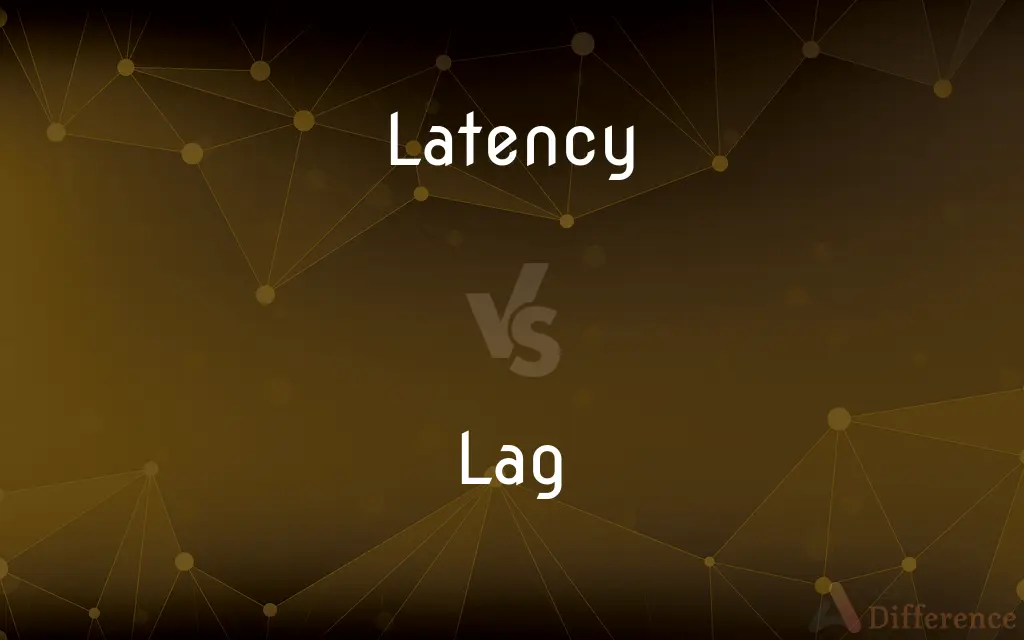Latency vs. Lag — What's the Difference?
Edited by Tayyaba Rehman — By Maham Liaqat — Updated on March 14, 2024
Latency is the time delay between a signal's initiation and reception, often in computing, while lag refers to a noticeable delay in action response, commonly in gaming or real-time applications.

Difference Between Latency and Lag
Table of Contents
ADVERTISEMENT
Key Differences
Latency represents the time taken for data to travel from its source to its destination across a network, emphasizing the speed and efficiency of data transmission. This is crucial in applications requiring real-time interaction, such as video conferencing. On the other hand, lag is often the user-perceived delay or the time difference between initiating an action and seeing the result. It's especially relevant in online gaming, where real-time response is critical for gameplay.
Latency is measured in milliseconds and directly influences the responsiveness of an online service or application. Lower latency means quicker data transmission, leading to a smoother user experience. Whereas, lag not only encompasses this delay but can also be influenced by other factors like processing time on the user's device or server-side processing delays, making it a more encompassing term for any delay experienced by the user.
Network design, internet connection speed, and the distance data must travel all impact latency. Optimizing these factors can significantly reduce latency. Conversely, lag can be caused by a wider range of issues, including hardware limitations, insufficient bandwidth, or server overload, and requires a broader approach to mitigation.
Reducing latency is often a priority in the design of networks and applications, with techniques such as edge computing brought into play to minimize delays. Lag reduction, on the other hand, might involve not only network improvements but also hardware upgrades or software optimizations to ensure swift action-to-reaction sequences.
While latency is a more technical measure of network performance, lag is a broader concept that encompasses user experience. As such, addressing latency is a part of solving lag issues, but not the entirety of it. Strategies to combat lag therefore often include improving latency as well as enhancing the overall system's performance.
ADVERTISEMENT
Comparison Chart
Definition
Time delay between a signal's initiation and reception.
Overall delay between initiating an action and the outcome becoming noticeable.
Measurement
Typically measured in milliseconds (ms).
Can be qualitative (user perception) or quantitative (ms, frame rate drops).
Main Influences
Network speed, distance between devices, network hardware.
Network issues, processing power, hardware capabilities, software efficiency.
Impact Area
Primarily affects real-time data transmission efficiency.
Affects user experience in real-time applications, especially in gaming.
Mitigation Methods
Optimizing network infrastructure, reducing distance data travels.
Upgrading hardware, optimizing software, improving network conditions.
Compare with Definitions
Latency
Time taken for a packet of data to be transferred from its source to its destination.
Lowering network latency can significantly improve online gaming experiences.
Lag
Noticeable delay between an action and its effect in digital applications.
Experiencing lag during an online game can lead to a poor performance.
Latency
Critical factor in real-time applications like telemedicine.
Latency reduction is essential for the success of remote surgery applications.
Lag
Often caused by high latency but can also result from hardware inefficiency.
Reducing graphic settings can help minimize lag on older computers.
Latency
Measure of time delay in systems, notably networks.
Internet service providers often advertise low latency as a key feature of their service.
Lag
Addressed through a combination of hardware and software optimizations.
Developers often release patches to reduce lag in video games.
Latency
Delay in the transmission of data across a network.
High latency in a video call can lead to awkward pauses and interruptions.
Lag
Can refer to slow response times in computing and online gaming.
Upgrading your internet connection can reduce lag.
Latency
Influences the efficiency of data centers and cloud computing services.
Cloud services optimize their infrastructure to minimize latency.
Lag
Affects user experience, particularly in interactive applications.
Virtual meetings without lag make for more natural conversations.
Latency
The state or quality of being latent.
Lag
In online gaming, lag is a noticeable delay (latency) between the action of players (input) and the reaction of the server supporting the game, which has to be sent back to the client. The player's ability to tolerate lag depends on the type of game being played.
Latency
(Psychology) The latency period.
Lag
To fail to keep up a pace; straggle
A hiker who lagged behind his companions on the trail.
Latency
A latent period.
Lag
To proceed or develop with comparative slowness
A nation that lags behind its neighbors in economic development.
Latency
The time interval between initiating a query, transmission, or process, and receiving or detecting the results, often given as an average value over a large number of events.
Lag
To weaken or slacken; flag
My attention lagged when the lecturer changed subjects.
Latency
Concealment; the state of being latent; the state of being hidden.
Lag
(Games) To determine the order of play by hitting or shooting a ball toward a mark, as in marbles or billiards, with the player whose ball stops closest to the mark going first.
Latency
Dormancy; the state of being inactive.
Lag
To fail to keep up with (another)
One horse lagged the others throughout the race.
Latency
(electronics) A delay, an interval between the initiation of something and the occurrence.
Lag
To proceed or develop at a slower pace than (another)
"putting new money into sectors that have lagged the market" (Peter Lynch).
Latency
(medicine) The delay between a stimulus and the response it triggers in an organism.
Lag
(Sports) In golf, to hit (a putt) so that it stops a short way from the hole and can then be tapped in.
Latency
The state or quality of being latent.
To simplify the discussion, I shall distinguish three degrees of this latency.
Lag
To furnish or cover with lags.
Latency
The time between a stimulus the appearance of the response; the time between any causal action and the first appearance of the effect. Called also latent period.
Lag
To arrest.
Latency
The time between exposure to a carcinogen or other disease-causing agent and the appearance of the consequent disease.
Lag
To send to prison.
Latency
(computer science) the time it takes for a specific block of data on a data track to rotate around to the read/write head
Lag
An interval between one event or phenomenon and another
"He wondered darkly at how great a lag there was between his thinking and his actions" (Thomas Wolfe).
Latency
The time that elapses between a stimulus and the response to it
Lag
A condition of weakness or slackening
A lag in interest.
Latency
The state of being not yet evident or active
Lag
A barrel stave.
Lag
A strip, as of wood, that forms a part of the covering for a cylindrical object.
Lag
A convict.
Lag
An ex-convict.
Lag
(obsolete) Last; long-delayed.
Lag
Last made; hence, made of refuse; inferior.
Lag
(countable) A gap, a delay; an interval created by something not keeping up; a latency.
Lag
(uncountable) Delay; latency.
Lag
One sentenced to transportation for a crime.
Lag
A prisoner, a criminal.
Lag
(snooker) A method of deciding which player shall start. Both players simultaneously strike a cue ball from the baulk line to hit the top cushion and rebound down the table; the player whose ball finishes closest to the baulk cushion wins.
Lag
One who lags; that which comes in last.
Lag
The fag-end; the rump; hence, the lowest class.
Lag
A stave of a cask, drum, etc.; especially (engineering) one of the narrow boards or staves forming the covering of a cylindrical object, such as a boiler, or the cylinder of a carding machine or steam engine.
Lag
A bird, the greylag.
Lag
To fail to keep up (the pace), to fall behind.
Lag
To cover (for example, pipes) with felt strips or similar material referring to a time lag effect in thermal transfer]].
Lag
To respond slowly.
My phone is starting to lag.
Lag
To transport as a punishment for crime.
Lag
To arrest or apprehend.
Lag
(transitive) To cause to lag; to slacken.
Lag
Coming tardily after or behind; slow; tardy.
Came too lag to see him buried.
Lag
Last; long-delayed; - obsolete, except in the phrase lag end.
Lag
Last made; hence, made of refuse; inferior.
Lag
One who lags; that which comes in last.
Lag
The fag-end; the rump; hence, the lowest class.
The common lag of people.
Lag
The amount of retardation of anything, as of a valve in a steam engine, in opening or closing.
Lag
A stave of a cask, drum, etc.;
Lag
See Graylag.
Lag
The failing behind or retardation of one phenomenon with respect to another to which it is closely related; as, the lag of magnetization compared with the magnetizing force (hysteresis); the lag of the current in an alternating circuit behind the impressed electro-motive force which produced it.
Lag
One transported for a crime.
Lag
To walk or more slowly; to stay or fall behind; to linger or loiter.
Lag
To cause to lag; to slacken.
Lag
To transport for crime.
She lags us if we poach.
Lag
The act of slowing down or falling behind
Lag
The time between one event, process, or period and another
Lag
One of several thin slats of wood forming the sides of a barrel or bucket
Lag
Hang (back) or fall (behind) in movement, progress, development, etc.
Lag
Lock up or confine, in or as in a jail;
The suspects were imprisoned without trial
The murderer was incarcerated for the rest of his life
Lag
Throw or pitch at a mark, as with coins
Lag
Cover with lagging to prevent heat loss;
Lag pipes
Common Curiosities
Does latency affect all online activities?
Yes, but its impact is more critical in time-sensitive applications like online gaming or video conferencing.
What causes high latency?
High latency can be caused by slow network speeds, long distances between the server and client, or congested network paths.
How can latency affect online gaming?
High latency can result in delayed actions within the game, affecting the player's ability to interact in real-time.
Does geographical distance always affect latency?
Generally, yes, as data has to travel longer distances, though modern technologies can mitigate this effect.
What is lag?
Lag is the noticeable delay between an action and its reaction, often affecting gaming and video streaming.
Can lag be fixed?
Yes, by improving internet speed, upgrading hardware, or optimizing the game or application settings.
What is latency?
Latency is the delay between the initiation and completion of a process, like sending data over the internet.
What causes lag in video games?
Causes include high network latency, insufficient hardware capabilities, or server issues.
What's the difference between latency and bandwidth?
Latency is about delay, while bandwidth is about the volume of data that can be transmitted in a given time.
Why is low latency important in live streaming?
It ensures the stream is as real-time as possible, enhancing viewer engagement.
Can software updates reduce lag?
Yes, if they include optimizations that improve efficiency or resource usage.
Is latency the same as ping?
Not exactly; ping measures the round-trip time of data to a server and back, often indicating latency.
How do ISPs reduce latency?
By optimizing their network infrastructure and routing paths to minimize delays.
Are there tools to measure latency?
Yes, tools like ping tests and traceroute can measure network latency.
Can using a VPN increase latency?
Yes, because it can route your data through longer paths, increasing the travel time.
Share Your Discovery

Previous Comparison
Lay vs. Secular
Next Comparison
Wiki vs. BlogAuthor Spotlight
Written by
Maham LiaqatEdited by
Tayyaba RehmanTayyaba Rehman is a distinguished writer, currently serving as a primary contributor to askdifference.com. As a researcher in semantics and etymology, Tayyaba's passion for the complexity of languages and their distinctions has found a perfect home on the platform. Tayyaba delves into the intricacies of language, distinguishing between commonly confused words and phrases, thereby providing clarity for readers worldwide.
















































